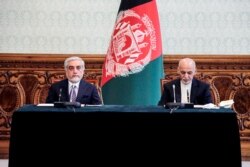With each new victory claimed by the Taliban, the message from Washington to the Afghan government in Kabul becomes more pointed: The failure to blunt the Taliban's military offensive rests on you.
The message has also become increasingly public.
"Afghan leaders have to come together. The future of the country is really on their shoulders," White House press secretary Jen Psaki told reporters Wednesday.
Afghan security forces "have what they need," she added. "What they need to determine is if they have the political will to fight back and if they have the ability to unite as leaders to fight back."
Asked about Afghan President Ashraf Ghani, Pentagon press secretary John Kirby was equally blunt.
"We're not prescribing specific methods of defense for him. It's his country. He's commander in chief," Kirby said. "It's his political leadership, his political will that can make a big difference here."
The comments Wednesday from the White House and Pentagon mirrored sentiments expressed a day earlier by U.S. President Joe Biden, who defended his decision to follow through on the February 2020 Doha agreement with the Taliban and bring U.S. troops home after nearly two decades of war.
"We spent over a trillion dollars over 20 years. We trained and equipped with modern equipment over 300,000 Afghan forces," Biden said Tuesday. "They outnumber the Taliban."
"They've got to want to fight," he told reporters.
But frustration in Washington appears to be building.
U.S. defense officials have repeatedly argued that the U.S.-trained Afghan security forces have the capacity and the capability to mount a much stiffer defense against Taliban fighters, who now claim to have overrun nine provincial capitals in less than a week.
Officials have also defended U.S. efforts to bolster Afghan defenses, pointing to an increase in U.S. airstrikes dating back to July that at first targeted weapons and equipment captured by the Taliban and have focused more recently on supporting Afghan forces battling the Taliban in Kandahar, Herat and Lashkar Gah, all of which have been under a sustained threat.
At the same time, U.S. officials have become increasingly defensive when fielding questions about the repeated failure of the U.S.-trained Afghan security forces to thwart Taliban advances.
"I would challenge the assumption ... that we fell short over the course of 20 years," the Pentagon's Kirby told reporters Wednesday.
"The narrative that in every place and every way the Afghan forces are simply folding up and walking away is not accurate," he said. "There are places and there are times, including today, where Afghan forces in the field are putting up a fight."
"It comes down to leadership on the battlefield and leadership in Kabul," Kirby said.
Adding to the concerns are new U.S. intelligence assessments, first reported by The Washington Post, that Kabul could fall to the Taliban in as little as 30 days.
U.S officials refused to publicly comment on the report, beyond emphasizing that "no particular outcome, in our view, is inevitable."
But senior U.S. officials Wednesday refused to rule out offering Afghan forces additional help beyond the August 31 deadline for the U.S. withdrawal, with the White House going as far as to say, "It's a good question."
"Right now, the authorities that we have to support the Afghans from the air expire at the end of this month," the Pentagon's Kirby said when pressed on the matter by VOA. "There has been no policy decision about what it looks like beyond that, and I'm simply not going to speculate."

